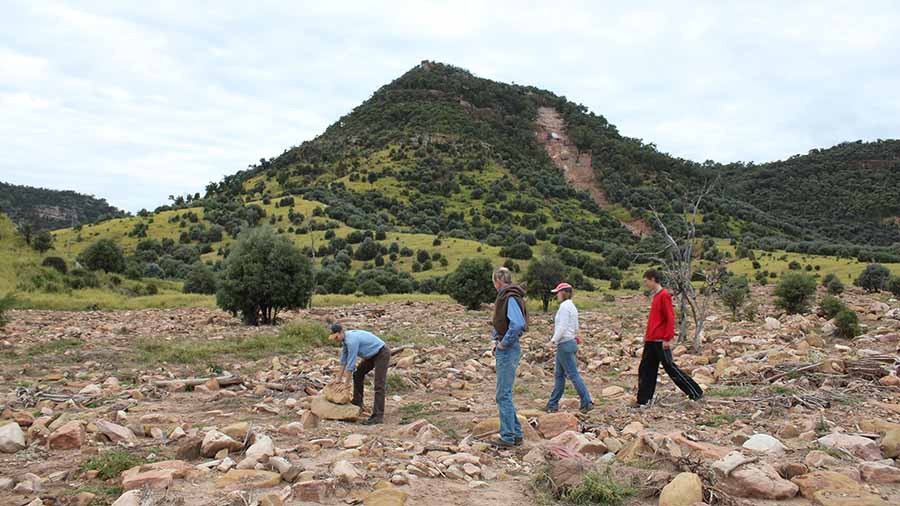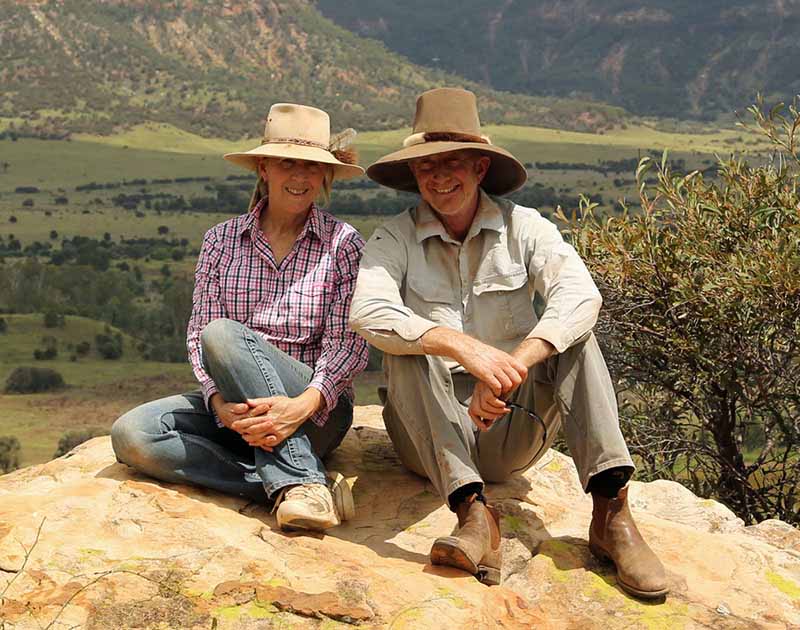David clearly remembers the noise of the water coming off the cliffs,
a roar that is imprinted on his memory.
The season of 2011 was unlike any other, with 1550 millimetres of rain measured at Mt Kingsley, which was more than double the normal annual rainfall. So when a storm event dumped more than 220 millimetres of rain overnight just before Christmas that year, the waterlogged cliffs couldn't cope. It was the same storm that hit Toowoomba and Grantham and caused so much devastation, and while the focus was understandably on the more populated areas, the local damage done at Mt Kingsley was dramatic.
 The aftermath of landslides at Mt Kingsley in 2011
The aftermath of landslides at Mt Kingsley in 2011
David clearly remembers the noise of the water coming off the cliffs, a roar that is imprinted on his memory. He also recalls feeling shell-shocked as he ventured out to survey the damage. What he saw were rocks the size of cars strewn across the paddocks, and what he describes as 'water like custard' oozing across the paddocks.
'There were dozens of landslides along the range, and there was rubbish everywhere,' David says. 'Because we had received a lot of rain that year, we had plenty of ground cover but the force of the water was too strong to stop the landslides.'
Mt Kingsley was a mess, with the force of the water bursting dams built in gullies, filling other dams with silt, destroying kilometres of fencing and leaving paddocks covered with debris.
There was so much damage after that rain event that it was almost overwhelming, but David and Chris Benn have chipped away at restoring Mt Kingsley one dam and one fence line at a time.
The initial response was to find all their cattle, and despite the ferocity of the rain, just 10 of the 1200 cattle were missing. Those that were safe were mustered into the paddocks which still had fencing. It was then a process of standing up fences and cleaning out dams, with the latter a costly process. Dam renovation has cost them $250,000 to date.
...any dams that had been washed out were rebuilt in
a slightly different position.
While fences that could be were stood up, and others rebuilt along the same fence lines, any dams that had been washed out were rebuilt in a slightly different position. 'We wanted to be able to make the most of the water coming down the gullies, but rebuilding in the same spot meant that they could be washed out again,' David says.
The solution was to move the dams slightly to the side of the gully and build a bridge and bank to divert the water into the dam in its new position.
The changes have dual benefits; the bank will wash out and not the whole dam should there be another major rain event, but it has also improved water quality. David says that water quality has always been an issue, coming off the hills 'like chocolate', as has dams filling with silt, but the new sites for dams have seen some improvement.
Another strategy to improve water quality has involved planting of water weeds, like para grass, which have worked to partially clear the water.
The minor changes the Benns have made to Mt Kingsley should stand them in good stead should another major erosion event occur. It was not realistic or reasonable to think about large scale moves of fenclines or dams. And David says there is no ability to prepare for a similar event, unlike bush fires or droughts.
Yet those slight tweaks, and especially the change in position of catchment dams in gullies, has improved water quality and potentially protected them from being blown out again. But this major weather event and the erosion control that has followed has made David hyper aware that it could happen again.
Seeing the fallout from the 2011 event made him look more closely at the landscape.
He says seeing the fallout from the 2011 event made him look more closely at the landscape, and it was possible to see signs of previous landslides once he knew what to look for.
It was evident on trees, where the bark had been stripped from one side as the force of water and debris hit them from previous events.
It hasn't made it any easier to prepare, but it has given him a greater understanding of the country he runs and how nature can be both cruel and kind.



